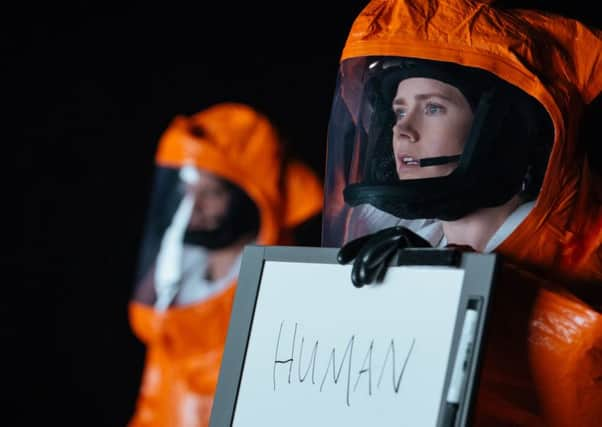Alistair Harkness: The ten best films of 2016


1) Arrival
Starring Amy Adams as a linguist recruited by the government to communicate with alien life forms, it wasn’t hard to see why Denis Villeneuve’s thoughtful sci-fi puzzle resonated: Arrival landed the week Donald Trump became president elect and immediately presented a more reasonable scenario for diplomacy than we’re ever likely to get in reality. But it was the way the film managed to combine its subtly dazzling narrative shifts and transcendent visuals with Adams’s openhearted performance that made it the year’s best film – and an instant classic of the genre.
2) Green Room
The rise of the Alt-Right might have made Green Room’s punks-v-Neo-Nazis premise depressingly relevant in 2016, but no action or horror movie was as brutally efficient in its execution as this gnarly siege movie from Blue Ruin director Jeremy Saulnier. Patrick Stewart terrified as a white supremacist who uses his backwoods rock club to recruit disenfranchised Americans to his cause, but the film really belonged to Anton Yelchin as the earnest guitarist whose band mistakenly accept a gig and have to fight for survival after inadvertently witnessing a murder. Tragically, Yelchin died shortly after the film’s release. His performance here showed he was just getting started.
3) Love & Friendship
Advertisement
Hide AdAs a woman of “diabolical genius”, Kate Beckinsale was on career-best form in this delectably pithy adaptation of the Jane Austen novella Lady Susan. Reteamed with her Last Days of Disco director Whit Stillman (also back to his best), her tart delivery of Austen’s irony-drenched witticisms made it impossible not to root for her scheming character.
4) Spotlight
The surprise winner of this year’s Best Picture Oscar, Spotlight dramatised with engrossing exactitude the Boston Globe’s 2001 investigation of the Catholic Church cover-up of paedophile priests and the culture of silence surrounding the issue. Pablo Larraín’s thematically similar The Club may have been more artistically daring, but like a good piece of reporting, Spotlight’s co-writer and director Tom McCarthy let content dictate form, stripping the film of any melodrama, sentiment or unnecessary detail: this was a gripping thriller with no place for false heroics, just an enduring respect for getting the job done and done well.
5) The Hateful Eight
Set mostly in a single room in a snowbound haberdashery in the aftermath of the Civil War, Quentin Tarantino’s latest confounded many by using super-widescreen cinematography not to romanticise the wide-open landscapes of the western, but to challenge the genre’s myopic view of history. Focusing on the titular rogues’ gallery of reprobates as they turned on each other in violent and horrifying ways, he transformed his Reservoir Dogs-esque location into a microcosm of America, exposing the dangerous divisions lurking in a country nowhere close to being healed.
6) Mustang
With challenges to women’s rights headline news, this Turkish-set drama – about a family of five orphaned sisters clashing with the patriarchal strictures of their hometown – couldn’t have been timelier. Making a mockery of Turkish society’s determination to make women compliant automatons, its protagonists’ collective predicament was no joke, but debut director Deniz Gamze Ergüven revelled in her characters’ natural exuberance and the symbolism of the title chimed especially well with Güneş Şensoy’s irresistible performance as the youngest member of the clan.
7) Victoria
There were two great bank robbery movies this year. Scottish director David Mackenzie stepped up to the big league with his American crime thriller Hell or High Water, but this German film – set in the hour before and after a heist – edged ahead by using the adrenalin-juicing chaos of its premise as a brilliant metaphor for the high-stakes nature of the filmmaking process itself. Shooting in a single, continuous, two-hour-plus take across 20 locations in Berlin in the early hours of the morning, writer/director Sebastian Schipper harnessed the nervous energy of his cast and crew to make a remarkable film about the calamities that can be unleashed when you break the rules. The results were exhilarating.
8) The Pearl Button
The brutal legacy of colonialism was expertly essayed in both The Revenant and Embrace of the Serpent this year, but its tragic effects were nowhere more poignantly evoked than in this mind-blowing documentary from Chilean filmmaker Patricio Guzmán. Delving into the history of Chile’s “disappeared”, Guzman managed to make some abstract philosophical and cosmological theories concrete by looking at the integral part Chile’s lengthy coastlines have played in the country’s difficult history. Presenting colonialism as a barbaric form of time-travel in which water holds the key to the past, present and future, it was unlike any other film this year.
9) Anomalsia
Advertisement
Hide AdNo one picks at the scab of human misery quite like Charlie Kaufman and for his first foray into animation he made fascinating use of stop-motion puppets to tell a complex story about love and alienation that interrogated the movie-perpetuated belief that there’s someone out there for everyone. Sure, Your Name and Zootropolis also advanced the form in challenging ways, but did they feature the year’s most tender and unflinching sex scene? They did not.
10) The Nice Guys
Save for the crowd-rousing Creed, it was a rubbish year for franchises (even Jason Bourne sucked). It took real-life disaster movie Deepwater Horizon to inject genuine blockbuster thrills into the mainstream. For true connoisseurs of popcorn mayhem, though, there was The Nice Guys. Pairing Russell Crowe and Ryan Gosling in a 1970s-set murder mystery, Shane Black’s ferociously funny action comedy turned quip-and-kill chaos into a deliriously deranged artform – one that was as likely to throw gags about correct grammar usage into the mix as it was explosions and gunplay.